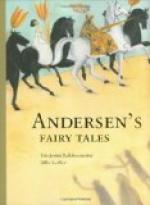“Travelling would be agreeable enough,” said he groaning, “if one only had no body, or could send it to rest while the spirit went on its pilgrimage unhindered, whither the voice within might call it. Wherever I go, I am pursued by a longing that is insatiable—that I cannot explain to myself, and that tears my very heart. I want something better than what is but what is fled in an instant. But what is it, and where is it to be found? Yet, I know in reality what it is I wish for. Oh! most happy were I, could I but reach one aim—could but reach the happiest of all!”
And as he spoke the word he was again in his home; the long white curtains hung down from the windows, and in the middle of the floor stood the black coffin; in it he lay in the sleep of death. His wish was fulfilled—the body rested, while the spirit went unhindered on its pilgrimage. “Let no one deem himself happy before his end,” were the words of Solon; and here was a new and brilliant proof of the wisdom of the old apothegm.
Every corpse is a sphynx of immortality; here too on the black coffin the sphynx gave us no answer to what he who lay within had written two days before:
“O mighty Death! thy silence teaches nought,
Thou leadest only to the near grave’s
brink;
Is broken now the ladder of my thoughts?
Do I instead of mounting only sink?
Our heaviest grief the world oft seeth not,
Our sorest pain we hide from stranger eyes:
And for the sufferer there is nothing left
But the green mound that o’er the coffin lies.”
Two figures were moving in the chamber. We knew them both; it was the fairy of Care, and the emissary of Fortune. They both bent over the corpse.
“Do you now see,” said Care, “what happiness your Galoshes have brought to mankind?”
“To him, at least, who slumbers here, they have brought an imperishable blessing,” answered the other.
“Ah no!” replied Care. “He took his departure himself; he was not called away. His mental powers here below were not strong enough to reach the treasures lying beyond this life, and which his destiny ordained he should obtain. I will now confer a benefit on him.”
And she took the Galoshes from his feet; his sleep of death was ended; and he who had been thus called back again to life arose from his dread couch in all the vigor of youth. Care vanished, and with her the Galoshes. She has no doubt taken them for herself, to keep them to all eternity.
THE FIR TREE
Out in the woods stood a nice little Fir Tree. The place he had was a very good one: the sun shone on him: as to fresh air, there was enough of that, and round him grew many large-sized comrades, pines as well as firs. But the little Fir wanted so very much to be a grown-up tree.
He did not think of the warm sun and of the fresh air; he did not care for the little cottage children that ran about and prattled when they were in the woods looking for wild-strawberries. The children often came with a whole pitcher full of berries, or a long row of them threaded on a straw, and sat down near the young tree and said, “Oh, how pretty he is! What a nice little fir!” But this was what the Tree could not bear to hear.




